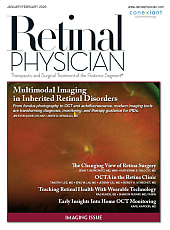In our October 2024 Ophthalmology Management article, we explored the growing wave of scrutiny directed at noncompete clauses in physician employment contracts. Since that time, the legal landscape has continued to evolve rapidly, with new state legislation, further guidance at the federal level, and legal challenges to the Federal Trade Commission’s (FTC) Final Rule.
Ophthalmologists navigating employment transitions should understand these developments since noncompete provisions remain a common feature in contracts for both employed physicians and practice sellers, despite their increasing legal vulnerability.
State-Level Momentum Grows
State legislatures continue to narrow the scope of permissible noncompetes in the health care sector, including for ophthalmologists. Following are some notable 2025 developments.
Colorado
As of June 2025, Colorado has fully banned noncompete agreements for physicians and other licensed health care providers, expanding on prior limitations.1 Under the new law, even narrowly tailored covenants and liquidated damages provisions are unenforceable, and medical providers can no longer be restricted from informing patients about their continued medical practice, new professional contact information, or the patient’s right to choose their provider.
Texas
In June, Texas Governor Greg Abbott signed legislation effective September 1,
2025, imposing stricter rules on noncompetes for physicians, dentists, nurses, and physician assistants.2 The law adds clarity to requirements for the enforceability of noncompetes, including details on what constitutes reasonable duration, geographic scope, and liquidated damages.
Indiana
Effective July 1, 2025, Indiana’s new law bars noncompete agreements between physicians and hospitals (or their parent or affiliated organizations).3 Existing agreements remain valid, but new contracts must omit post-employment restrictions except in the context of a sale of a business where the physician owns more than 50% of the business entity at the time of the sale.
Pennsylvania
As previewed in our prior article, Pennsylvania recently passed the Fair Contracting for Health Care Practitioners Act, rendering any new noncompete clause between a practitioner and an employer void and unenforceable since January 1, 2025.4 Existing noncompetes are nullified upon the provider’s license renewal.
Maryland
Maryland enacted legislation barring noncompete clauses for health care and veterinary practitioners earning $350,000 or less annually.5 For health care practitioners earning more than $350,000, a noncompete will only be enforceable if it restricts the provider’s activity for less than one year and includes a geographic limitation of less than 10 miles. On request of the patient, the provider’s former employer must inform patients of the new location where the provider will be practicing.
Arkansas
In March of 2025, Arkansas passed into law Senate Bill 139, banning most noncompetes for physicians.6 The new statute does not apply to noncompete agreements that are ancillary to an employment relationship or part of an otherwise enforceable employment agreement, provided that (1) the employer has a protectable business interest and (2) the covenant is limited with respect to time and scope in a manner that is not greater than necessary to defend the protectable business interest of the employer. The law also does not apply to noncompetes that are ancillary to other contractual relationships, such as the sale of a business or a franchise agreement.
Louisiana
Effective January 2025, noncompetes for primary care physicians may last no more than 3 years from the date of the initial agreement or contract.7 For all other physicians, a noncompete clause may last up to 5 years. The geographic range of the noncompete may include only the parish in which the physician primarily practices and 2 contiguous parishes. Any subsequent contract cannot contain a noncompete.
Utah
While noncompetes are still permissible for the majority of health care professionals, Utah passed Senate Bill 228 in March 2025, regulating health care services platforms—electronic systems that help health care workers find and accept short-term shifts at health care facilities.8 Under the new law, a health care services platform may not require health care workers to enter into a noncompete or restrict a health care worker from finding or accepting a shift using another platform or with another health care provider or facility.
Federal Guidance and Uncertainty
At the federal level, the Federal Trade Commission’s (FTC) sweeping Final Rule banning most noncompete clauses was formally published in May 2024 and set to take effect September 4, 2024. However, implementation remains uncertain due to legal challenges. The district court for the Northern District of Texas blocked the rule from taking effect, finding that the FTC lacked the statutory authority to issue such a rule and that the rule was arbitrary and capricious.9 The FTC initially appealed the district court’s decision but after the change in administration, filed a motion to stay the proceedings to reconsider whether the FTC should continue to defend the rule.10
Even if the FTC under a second Trump administration appears unlikely to defend the FTC’s Final Rule in court, the FTC and Department of Justice (DOJ) continue to signal potential disfavor toward noncompetes and similar restraints on worker mobility. In January 2025, the agencies jointly issued the Antitrust Guidelines for Business Activities Affecting Workers, replacing 2016 guidance and warning that noncompete clauses, no-poach agreements, and other contractual restrictions can raise antitrust concerns by limiting labor market competition and suppressing wages.11 The revised guidance emphasizes a sustained policy focus on dismantling structural barriers to competition in labor markets.
Conclusion
While noncompetes remain a powerful legal tool, their enforceability is increasingly tenuous, particularly in the health care sector. The evolving patchwork of state and federal law requires careful navigation but also presents an opportunity to re-evaluate the role of post-employment restrictions in today’s health care marketplace. OM
References
1. Colorado Senate Bill 25‑083, 2025 Reg. Sess. (Colo. 2025), available at https://leg.colorado.gov/sites/default/files/2025a_083_signed.pdf.
2. Tex. S.B. 1318, 89th Leg., Reg. Sess. (2025) available at https://capitol.texas.gov/tlodocs/89R/billtext/html/SB01318F.htm.
3. Ind. S.B. 475, 124th Gen. Assemb., 1st Reg. Sess. (2025), available at https://iga.in.gov/pdf-documents/124/2025/senate/bills/SB0475/SB0475.04.ENRH.pdf.
4. 2024 Pa. Act 74 (July 17, 2024), 2024 Pa. Laws 846, P.L. 846, No. 74, available at https://www.palegis.us/statutes/unconsolidated/law-information/view-statute?txtType=PDF&SessYr=2024&ActNum=0074.&SessInd=0.
5. Md. H.B. 1388, 446th Gen. Assem. (2025), available at https://mgaleg.maryland.gov/2024RS/Chapters_noln/CH_378_hb1388e.pdf. The law also applies to individuals who make less than 150% of the state’s minimum wage.
6. Ark. S.B. 139, 95th Gen. Assem. (2025), available at https://arkleg.state.ar.us/Home/FTPDocument?path=%2FBills%2F2025R%2FPublic%2FSB139.pdf.
7. La. S.B. 165, 2024 Regular Sess. (2023), available at https://www.legis.la.gov/legis/ViewDocument.aspx?d=1380721. A primary care physician is defined as a physician who predominately practices general family medicine, general internal medicine, general pediatrics, or general obstetrics or gynecology.
8. Utah S.B. 228, 65th Leg. General Sess. (2025), available at https://le.utah.gov/Session/2025/bills/static/SB0228.html. A “health care service platform” is defined as a person that operates or offers for use an electronic program, system, or application through which a health care worker may accept a shift to perform a health service or role, as an independent contractor at a health care facility.
9. See Ryan, LLC v. Fed. Trade Comm’n, 746 F. Supp 3d 369, 389 (N.D. Tx. 2024).
10. Appellant’s Unopposed Motion to Stay, Ryan, LLC v. Fed. Trade Comm’n, No: 24-10951 (5th Cir. 2025).
11. FTC & DOJ, Antitrust Guidelines for Business Activities Affecting Workers 4–6 (Jan. 2025), https://tinyurl.com/2pwtu85a.










